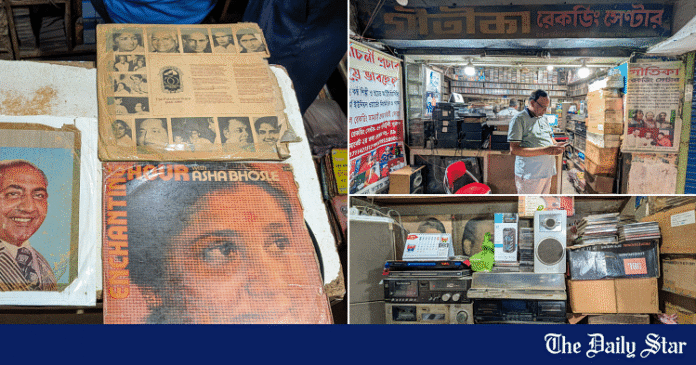Geetika Recording Centre in Old Dhaka preserves the soul of a fading era, offering cassettes, vinyl, and nostalgic music memories. Amid digital convenience, it stands as a timeless tribute to Bangladesh’s golden musical past.
Photo: Jawwad Sami Neogi
Bangladesh Bank signals market-based exchange rate regime
‚March to Jamuna‘: Police charge baton to disperse JnU students
Bangladeshi migrants in Malaysia: Dhaka’s uphill battle to break syndicate chains
Nursing students block Shahbagh
While walking through the narrow lanes of Patuatuli in Old Dhaka, I stumbled upon something I thought was long gone. An audio cassette shop! „Geetika Recording Centre“, one of the oldest surviving music stores in Dhaka, is located on the first floor of Nurul Haque Market, and stepping inside felt like stepping back in old times.
Time may pass, but some echoes never leave. CDs and cassettes remind us of a time when music was not just something we streamed; it was something we collected, felt with our hearts and cherished. Patuatuli — a place that once echoed with music, rhythm, and voices immortalised on tape — has seen most of its iconic shops fade away. Yet, Geetika Recording Centre stands as one of the last survivors of that golden era.
The shop was started in the ’70s by Santosh Kumar Roy, a soft-spoken man with a deep passion for music. Back then, he was a first-year university student who would often wander into cassette shops. One of his friends‘ brothers owned a shop there, and Roy would spend hours at the music store. Eventually, he started his own shop, and while many others closed down, his legacy still lives on.
„Back in those days, when you needed a shirt, you had to go to New Market, but if you wanted to record a song or buy one, you had to come to Patuatuli. Every musician of that time had walked through these lanes,“ Santosh Kumar Roy recalls.
According to him, the 1990s were the peak! Crowds would flood the area, so crowded that they even had to turn people away. „Those days are now memories. We barely get customers now,“ he sighs.
Roy shows me a vinyl record by the legendary playback singer and actress Suraiya Jamaal Sheikh, known as Suraiya, who was a superstar in the late 1940s and early 1950s.
„I still have this masterpiece,“ he says, handing over a record titled ‚Best of Suraiya.‘
His vinyl collection includes records that are even older. He also proudly displays a collection of records by Mohammed Rafi, one of the most influential singers of the subcontinent.
Roy shares, „Music is food for the brain. Even the busiest soul needs a few moments to breathe; that’s when you need music to calm yourself and feel alive again. Today, music is so easily accessible, and it’s great! But it has made this generation impatient. Back when gramophones were used, you could only play two songs at a time. So, you had to truly engage with the music and feel the emotions deeply.“
From floor to ceiling, the shop is filled with cassette players, DVDs, CDs, and even old audio recorders. It might look like a small shop, but it’s more like a museum of lost melodies.
I ask, „Do people still buy these things?“
Roy smiles, „You’d be surprised. Many people around my age or older still prefer records and cassette players over YouTube. They say the sound feels raw, and the emotion more real.“
I met Showkat, who has been working there for 26 years, carefully restoring an old wedding video from a CD. The customer sat beside him, guiding him through the scenes — it was his own wedding video at risk of being lost.
That customer turns out to be Prembabu, a Bengali film actor known for playing ‚fighter‘ roles in the 1980s. He was also searching for CDs of the movies Daagi and Usilaa, in which he once played roles; films that are now nearly impossible to find.
Another visitor, Abdul Hannan Munna, an elderly music lover, came in with a handwritten list of songs. He still listens to songs on cassettes. „There’s something about the sound,“ he says. „You just don’t get that feeling from modern devices.“
The shop gets a mix of visitors: collectors, researchers, students, and people looking to transfer old cassette recordings onto memory cards, or vice versa. Some come just to relive memories, while others come to save them.
Prices for cassettes and CDs usually start from Tk 500 and can go up to Tk 1500 or more, according to Md Jabed, another long-time employee who has been working at the shop for about 24 years.
Roy passionately talks about music from the 1960s to the 1990s.
„The ’60s were the golden era, when legendary singers like Abdul Alim and Abbasuddin Ahmed shaped our music. There was a time when their songs were heard in every household. At weddings, the bride’s side only cared about one thing: a good speaker to play the music!“ he explains.
As I left Geetika Recording Centre, I paused at the stairs. Isn’t that all we need sometimes — a rewind button, playing a song we’ve forgotten, visiting a place where time stands still, or trying to hold the past a little closer?
I look back and hear the shop gently whispering, „Some things are too beautiful to be forgotten, no?“
